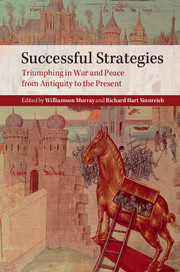Book contents
- Frontmatter
- Dedication
- Contents
- List of tables and map
- List of contributors
- Acknowledgments
- Introduction
- 1 The strategic thought of Themistocles
- 2 The grand strategy of the Roman Empire
- 3 Giraldus Cambrensis, Edward I, and the conquest of Wales
- 4 Creating the British way of war: English strategy in the War of the Spanish Succession
- 5 Failed, broken, or galvanized?
- 6 Victory by trial and error: Britain’s struggle against Napoleon
- 7 The strategy of Lincoln and Grant
- 8 Bismarckian strategic policy, 1871–1890
- 9 Dowding and the British strategy of air defense 1936–1940
- 10 US naval strategy and Japan
- 11 US grand strategy in the Second World War
- 12 American grand strategy and the unfolding of the Cold War 1945–1961
- 13 The Reagan administration’s strategy toward the Soviet Union
- Afterword
- Index
- References
Introduction
Published online by Cambridge University Press: 05 June 2014
- Frontmatter
- Dedication
- Contents
- List of tables and map
- List of contributors
- Acknowledgments
- Introduction
- 1 The strategic thought of Themistocles
- 2 The grand strategy of the Roman Empire
- 3 Giraldus Cambrensis, Edward I, and the conquest of Wales
- 4 Creating the British way of war: English strategy in the War of the Spanish Succession
- 5 Failed, broken, or galvanized?
- 6 Victory by trial and error: Britain’s struggle against Napoleon
- 7 The strategy of Lincoln and Grant
- 8 Bismarckian strategic policy, 1871–1890
- 9 Dowding and the British strategy of air defense 1936–1940
- 10 US naval strategy and Japan
- 11 US grand strategy in the Second World War
- 12 American grand strategy and the unfolding of the Cold War 1945–1961
- 13 The Reagan administration’s strategy toward the Soviet Union
- Afterword
- Index
- References
Summary
Everything in strategy is very simple, but that does not mean that everything is very easy. Once it has been determined . . . it is easy to chart its course. But great strength of character, as well as great lucidity and firmness of mind, is required in order to follow through steadily, to carry out the plan, and not to be thrown off course by thousands of diversions.
In my career as a military historian, the subject of strategy has come to play an increasingly important role in the topics that I have examined. This has to a considerable extent been the result of the realization expressed by my colleague Allan Millett and myself in an article dealing with the lessons from our study on military effectiveness in the first half of the twentieth century:
Whether policy shaped strategy or strategic imperatives drove policy was irrelevant. Miscalculations in both led to defeat, and any combination of politico-strategic error had disastrous results even for some nations that ended the war as members of the victorious coalition . . . This is because it is more important to make correct decisions at the political and strategic level than it is at the operational and tactical level. Mistakes in operations and tactics can be corrected, but political and strategic mistakes live forever.
- Type
- Chapter
- Information
- Successful StrategiesTriumphing in War and Peace from Antiquity to the Present, pp. 1 - 16Publisher: Cambridge University PressPrint publication year: 2014



